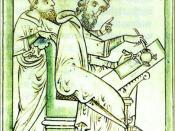In Plato's Gorgias, Socrates points out the political danger posed by careless education. The dialogue is split up into three parts, one for each of Socrates subjects that he converses with. The three main points of view evident in Gorgias other than Socrates' are that of Polus, Gorgias, and Callicles. Each of these men has a different point of view on the subject of politics, especially when speaking of justice and politics together in an argument. Socrates starts off the dialogue by discussing with Gorgias the art of rhetoric through oratory. Socrates proves through his own crafty rhetoric that oratory is not a craft like shipbuilding or masonry but a knack like pastry baking and that many jobs include oratory and therefore oratory by itself cannot be a craft. Socrates goes on to sum up his point by saying "⦠oratory is a producer of conviction-persuasion and not of teaching- persuasion concerning what is just and unjust (455a)," the major topic to come later in the dialogue.
Socrates' first conversation is with his Athenian counterpart Gorgias. In conversation, Socrates tries to tell Gorgias that politics itself cannot be taught without first teaching justice. Socrates points out to Gorgias that most, if not all, politicians in the Athenian political scene use rhetorical oratory and their political influence to do what's best for themselves, not what's best for their people. The use of oratory does not have to be done in an unjust way, but Socrates argues that some politicians in Athens are using this talent to persuade the people in the wrong way. Socrates makes an analogy that best sums up his argument. He says "Pastry baking has put on the mask of medicine, and pretends to know the foods that are best for the body, so...


